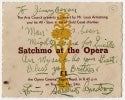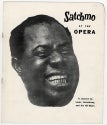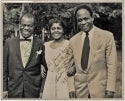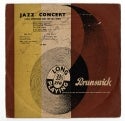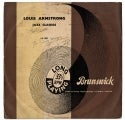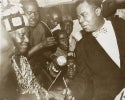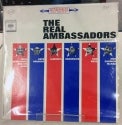For two days in May 1956, Louis Armstrong visited the city of Accra, then the capital of the British Gold Coast Colony. Edward R. Murrow arranged the trip. Producer of the popular CBS television series See It Now, Murrow had visited Accra in 1954, and he was eager to see what impact the city’s cultural life might have on a performer like Louis Armstrong. Murrow was in the process of producing a documentary about Armstrong called The Saga of Satchmo, and he reasoned that capturing footage of Armstrong’s first encounter with Africa, the land of his ancestors, would make for powerful cinema. He was right.
Murrow reached out to a colonial officer in Accra named Jimmy Moxon for assistance in organizing Armstrong’s visit. Born in Britain and educated at Cambridge, Moxon had moved to Accra at age 22. By the time Armstrong arrived with his All Stars, Moxon was a District Commissioner, with close ties to both the entertainment industry and native African leaders such as Prime Minister Kwame Nkrumah. Moxon often described the Armstrong visit to Accra as a life-changing event, not only for himself, but for the Gold Coast Colony, which was in the final stage of becoming the independent nation of Ghana. Sensing that Armstrong’s encounter with the people of Accra would be of historic significance, he documented every stage of the musician’s visit. This exhibition offers a selection of some of the mementos Moxon preserved.
“Armstrong Akwaba!”
Printed broadside [Accra, 1956].
Louis Armstrong travelled to Accra with his wife Lucille and his band, the All Stars. They had just completed an exhausting month-long tour of Europe, where they had performed in a different city every night. When they arrived at the airport in Accra on the morning of May 23, over 10,000 fans greeted them on the tarmac, waving signs and yelling “Armstrong Akwaba!” (Welcome Armstrong). As Armstrong exited the plane 13 African bands perched atop trucks began playing and singing “All For You, Louis, All For You!” Armstrong was so moved that he pulled out his trumpet and began playing along. As the journalist Robert Raymond noted: “the noise and the clamour rose to the skies in the greatest paean of welcome Accra had ever known.”
Satchmo the Great
J. Moxon, manuscript in ink. 19. pp Folio.
During Armstrong’s visit, Moxon put pen to paper and described various details of the trip, many of which would otherwise have gone undocumented. Moxon also described what an honor and thrill it was to host Louis Armstrong: “I could not in fact have been handed a more exciting offer even if I’d been given a wide open choice – for Louis Armstrong was my boyhood hero. I’d collected his discs – old Decca 78s – since I was 12, and still have many of them –‘Stormy Weather,’ ‘Solitude,’ ‘Thanks a Million,’ – and all now autographed by the maestro himself.”
“Welcome to Louis Armstrong … Playing at the Old Polo Ground … And at the Opera Cinema”
Printed color broadside. Accra, West African Graphic Company, 1956.
The Gold Coast Today
Vol. 1, No. 10. Photographic Illustrations. 4to. 12 pp. London, May 23, 1956.
The Gold Coast Colony was in the process of becoming the independent nation of Ghana during Armstrong’s visit. This issue of The Gold Coast Today featured an article on the upcoming elections as well as a feature on Louis Armstrong.
VIP Pass to “Satchmo at the Opera” performance on May 24. Inscribed by Armstrong to Moxon thanking him for his hospitality. [Accra, 1956].
Newspaper clipping featuring Lucille Armstrong dancing with a British Press Officer at the Independence Ball hosted by Prime Minister Kwame Nkrumah at Mensah’s Paramount Night Club on May 24, 1956. Newspaper source unknown.
Armstrong had a full schedule in Accra. On the afternoon of his arrival, he and the All Stars performed an open-air concert for over a 100,000 spectators at Accra’s Old Playing Ground. As Moxon described, when the crowd got a little unruly and the police responded with force, Armstrong was “beside himself with horror…. ‘I’ve seen this happen to my people in the South,’ he wailed, genuinely believing that mayhem was afoot. And it looked tough as the crowds at the back simply had to be prevented from totally crushing those at the front. ‘These are my people and they’ve come to hear me. For Chrissake stop those pigs!’ But at this stage there was no stopping anyone except for Satchmo and the All Stars who couldn’t stand it any longer and, in near hysterical frustration, brought the show to a sudden end.”
After the open-air concert, Armstrong and his musicians went to Mensah’s Paramount Night Club, where they had dinner before sharing the stage with a popular local band.
Satchmo at the Opera. Illustrated Program given to attendees of the May 24 concert at the Accra Opera House. 8pp. [Accra 1956]
Photo of Louis Armstrong, Lucille Armstrong, and Prime Minister Kwame Nkrumah
Prime Minister Nkrumah took great pride in accompanying Armstrong to various events during his stay in Accra. Although, as Moxon explained, Nkrumah had no idea who Armstrong was when he was first told of the visit: “‘Is it that boxer?’ he first asked, and then quickly added ‘Oh, I know: It’s the man who blows the bugle.’” After Armstrong’s visit, Kwame Nkrumah led Ghana to independence from Britain in 1957 and served as the nation’s first president.
“Lose Weight The Satchmo Way”
Lucille Armstrong and Louis Armstrong. Typed MS. Inscribed by Armstrong in green ink. 3 pp. Folio.
When Satchmo arrived in Accra, he was much thinner than he appeared in his publicity photos. When Moxon asked how he had managed to lose the weight, he was presented with an autographed typescript of Armstrong’s personal diet, which included large doses of an over-the-counter laxative call Swiss Kriss. “The more you shit the thinner you get!” claimed Armstrong.
Jazz Concert with Louis Armstrong and The All Stars
Louis Armstrong
LP with original printed sleeve.
Inscribed by Armstrong to Moxon.
Telegram from Louis Armstrong to Lucille Preston
Dated May 25, 1956. Photocopy.
On the afternoon of May 24, Armstrong and Lucille attended an open-air display of tribal dancing and drumming featuring performers from every region of Ghana. As Armstrong noted in a telegram to a friend the next day, during one of the performances, he saw a woman that looked just like his mother, who had passed away 20 years earlier. This encounter convinced Armstrong that his ancestors must have come from Ghana. “I came from here, way back. At least my people did. Now I know this is my country too.”
Signed program of The Ambassador of Jazz in his Triumphant Anniversary Engagement at the World Famous Roxy Theatre New York City 1957
Louis Armstrong.
[Illustrated]
Folio, original illustrated wrappers, pp. 16
[New York, 1957]
Even before Louis Armstrong visited Accra, his musical performances around the world had earned him the appellation “America’s Ambassador of Jazz.” As a foreign correspondent for the New York Times declared in November 1955: “America’s secret weapon is a blue note in a minor key…and Louis Armstrong is its most effective ambassador.” In 1960, Armstrong made the title official, when after many years of negotiation he joined the U.S. State Department’s Jazz Ambassador Program and travelled to Europe, Asia and various countries across the African continent.
The Real Ambassadors
Dave and Iola Brubeck, with Louis Armstrong
Original Cast Recording.
LP with original printed sleeve. [1961]
Dave and Iola Brubeck took note of Armstrong’s role as America’s most prominent jazz ambassador. They also noticed a disconnect between the message about race relations promoted by the State Department abroad and the reality of everyday life at home. In an effort to draw public attention to this issue, the Brubecks joined forces with Armstrong in 1961 and produced a musical titled The Real Ambassadors. Using satire as a means of criticizing the State Department’s apparent disinterest in racial conflict in the U.S., the musical also celebrated Armstrong’s key role as a music diplomat and defender of the Civil Rights movement.
Curated by Anna Harwell Celenza.
Assisted by John Buchtel, Ethan Henderson, Stephanie Hughes.
Photography by David Hagen.






